We live in a digital world, and that brings with it digital crime and malicious online activity. As new technology and programs make their way onto the market, new scams pop up every day. It can become quite difficult to ascertain what’s a scam and what’s legitimate. However, if you think you find yourself falling victim to an online scam, here are five tips you can follow to protect yourself or others.
1. Watch for Urgency and Authority Tactics
A common strategy that scammers often employ is scaring and confusing the victim. They usually do this by claiming that time is of the essence and that they have the authority to hold you accountable for anything that goes wrong. Governments and other trusted agencies/companies will typically never contact you and rush you to complete anything.
2. Look Up Their Phone Number, Email, Name, etc.
Searching for a potential scammer’s information on Google can provide you info on that specific contact or provide information on the type of scam you may be experiencing. Scammers go after tons of people in a day, so it’s not unlikely that someone would post about what they encountered and potentially the contact information they received it from. Remember, anything can be faked to look legitimate, including websites, emails, and even caller IDs.
3. NEVER Click on a Link from an Entity You Don’t Know
In addition to scammers pretending to be someone else, they also send links that look like normal documents, files you have to download, or websites you need to visit. NEVER click on these links! In addition to taking you to someplace on the internet where you don’t want to be, your data could also be potentially at risk such as your IP address, location, WiFi, and other revealing information.
4. Don’t Use Third Party Services to Pay
Trusted apps and websites typically have the time and resources to create a personalized payment system on their own and won’t use outside sources for this. When paying for anything online, if they ever take you to another website, be extremely careful about whether you decide to enter your information and pay. Banks and companies will typically never ask you to pay anything to a third party.
5. Report the Incident
If you believe you or someone you know has fallen victim to a scam (or almost have), contact the proper authorities and potentially the person or entity they were impersonating. Criminals and scammers alike rely on people to be too embarrassed or scared to report what happened. The truth of it is it happens all the time to even the most aware of people. Taking the time to report can end up saving you and others potentially affected.
Scams come in all different shapes and sizes, so it’s good to be informed about how to protect yourself and others. At the end of the day, trust your gut. If something feels wrong, it probably is. It’s never a bad idea to take your time when you’re worried it may be happening and take a step back to assess the situation. Learn more about scams that can affect you and stay prepared. Visit the FBI’s resource on common scams and crimes to be aware of.
